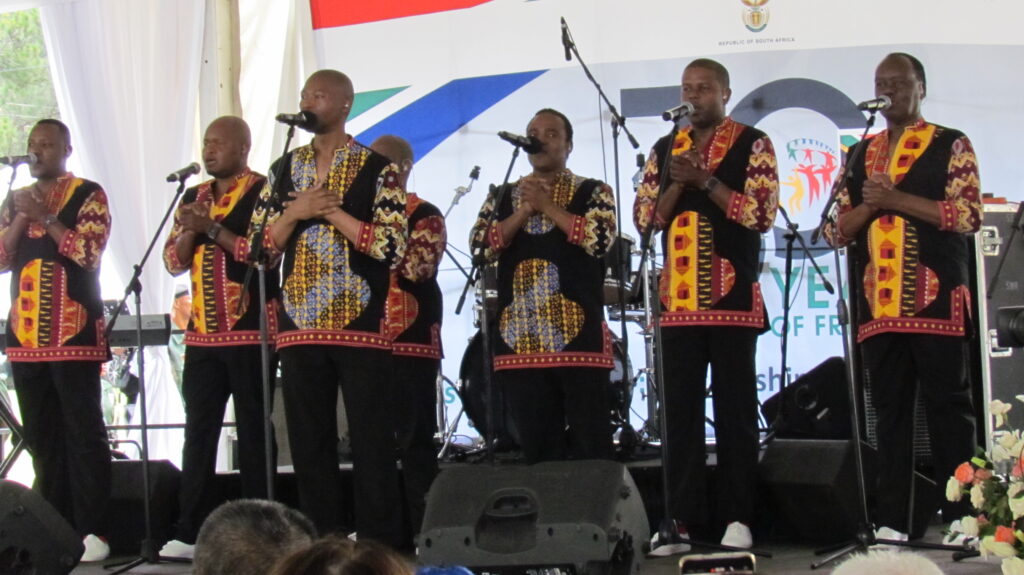
A lone, amputee protestor from Katlehong in the East Rand tried to disrupt President Cyril Ramaphosa’s Freedom Day speech at the Union Buildings in Tshwane on Saturday.
Holding aloft a banner that read “35 years of struggle,” the protestor bemoaned the fact that artists in South Afriac have been neglected since the dawn of democracy.
Be that as it may, the protestor was gently whisked away by the attendant security guards as he continued to shout in protest, thus allowing Ramaphosa to continue with this speech.
“Exactly thirty years ago on this day, freedom’s bell rang across our great land, it rang across every city, every town and every village,” said Ramaphosa in his opening remarks.

“The sound of freedom rang in Soweto, Sharpeville, Soshanguve, Evaton, Umlazi, Khayelitsaha and Micthell’s Plain,” he said.
He said the sound of freedom also rang in Kliptown, where a gathering known as “The Congress of the People” met in 1955 to map out a blueprint for a new, democratic South Africa in the form of The Freedom Charter.
“On that day, as we cast our votes for the very first time, a great heaviness lifted from our shoulders, our shackles had been cut off and the weight of centuries of oppression no longer held us down,” he said.
He said even though many people still bore the scars of the cruel lashes of those who had whipped and subjected them to ill-treatment for more than three hundred years, South Africans stood tall together as a united people on 27 April 1994.
He pointed out that thirty years later, South Africans gather as a united people of all races at the same Union Buildings that once symbolized pain and oppression.
He stressed that on 27 April of every year, South Africans fondly remember Nelson Mandela, the first democratically elected president and the father of the country’s democracy.
“We must never let our spirits be dampened by detractors, whether they are abroad or in our own country because all that they want is to diminish what we achieved in 1994 and in the years that followed,” enthused Ramaphosa.
“It is only those who willfully will not see, who shut their eyes to progress, who will deny that South Africa today is an infinitely better place than it was thirty years ago.
Ramaphosa acknowledged that despite the country’s achievements, South Africa remains a highly unequal society.
“Our people confront every day the apartheid legacy of unemployment, poverty and underdevelopment, crime, especially crimes of violence against women and children, which are a scourge to our communities,” he said.
He acknowledged that despite great progress, many households do not have electricity and clean water and there are still many families that go hungry.
Ramaphosa also pointed out that there is a huge divide between the rich and the poor in South Africa.
“At times, it seems like these challenges threaten to undermine the achievements we have made over the past years, and yet we know that if we work together, if we harness the same spirit of unity that we did in 1994, we will surely overcome,” he said.
The Freedom Day celebrations at Union Buildings were attended by various cabinet ministers, different ambassadors from different countries, traditional healers, traditional leaders and celebrities.

Different artist preformed for the crowd and guests from Thebe, Yvone Chaka Chaka and more.
A crowd of about 1000 was in attendance.
Flora Kekana of Ga-Rankuwa expressed joy at seeing Ramaphosa in person, because all along she had only seen her on TV.
“Though the ANC hasn’t managed to satisfy everybody, it has tried a lot and must be given another chance to bring a better life to the people of South Africa,” she said.
Amos Ndala of Mamelodi said although the government of the ANC has made many mistakes, it has also achieved much in the form of providing free houses, electricity and water to many people.
“For me there is no any other party which can rule South Africa and I will surely vote for the ANC come 29 May,” he said.
Various people were dressed in their cultural attire to signify the diverse society that South Africa is, with the Indians, the Ndebeles and the Zulus being the most prominent.
Tshwane Talks readers have been able to read stories in this publication for free for over two years now. We still want our readers to access our stories for free, but we are asking those among our readers who can afford it to contribute at least R30 a month to cover some of the costs of publishing this independent, non-aligned online newspaper which gives a voice to all sectors of society irrespective of race, colour, creed, religion, or political affiliation. You may make your contribution by depositing at least R30 a month into Tshwane Talks' bank account. Details are as follows:
Bank Details
Bank: Standard Bank
Account Number: 10225548834
Account Type: Cheque Account